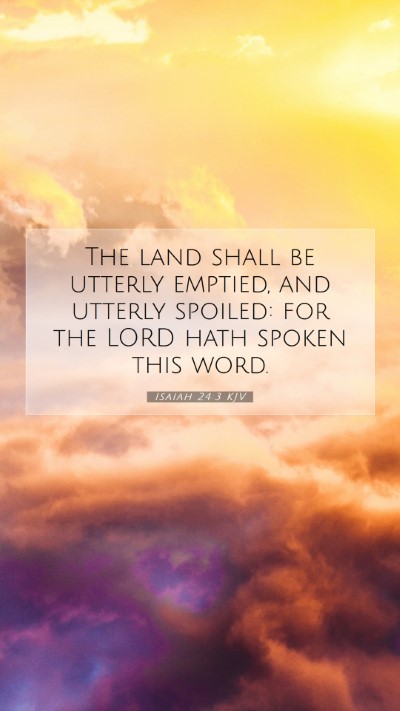Understanding Isaiah 24:3
Bible Verse: Isaiah 24:3
Verse Text: "The land shall be utterly emptied, and utterly spoiled: for the LORD hath spoken this word."
Overview
This verse is a striking proclamation concerning the desolation that will come upon the earth due to divine judgment. It encapsulates the themes of emptiness and destruction, indicating that what was once fruitful and full will become a wasteland as a result of rejecting God’s ways.
Bible Verse Meaning
Isaiah 24:3 reflects the seriousness of divine judgment. The imagery of the land being utterly emptied and spoiled serves as a metaphor for the judgment that will befall nations that turn away from God. Public domain commentaries suggest several important insights into this verse:
Matthew Henry's Commentary
- Divine Judgment: Henry emphasizes that this emptiness signifies God's displeasure with sin and the dire consequences that follow.
- Global Impact: The judgment affects not just Israel but all who dwell upon the earth. The message of accountability is universal.
- Call to Repentance: It is also a warning that implies a need for repentance, urging people to return to God before judgment falls.
Albert Barnes' Commentary
- Literal and Spiritual Interpretation: Barnes provides clarity on the dual meanings of this verse, noting that it foreshadows both historical events (like the Babylonian captivity) and broader eschatological implications.
- Context of Prophecy: He emphasizes the prophetic context, stating that Isaiah is proclaiming a future day of reckoning for nations contrary to God's laws.
Adam Clarke's Commentary
- Historical Context: Clarke delves into the historical backdrop, suggesting this verse reflects the devastation faced by societies when they stray from righteousness.
- The Certainty of the Word: He highlights that the declaration that "the LORD hath spoken this word" reinforces the certainty and unchangeability of God’s promise regarding judgment.
Application for Bible Study
This verse can serve as a poignant reminder of the need for personal and communal reflection on the path nations and individuals are walking. Here are some insights on how to apply this in Bible study groups and personal devotion:
- Reflection on Accountability: Consider the accountability of your life in light of God’s word. How does your lifestyle align with God's expectations?
- Group Discussion: Facilitate discussions in Bible study groups about the signs of societal decay and how they relate to Isaiah's warnings.
- Prayer for Restoration: Pray collectively for restoration not just personally but in communities and nations facing moral dilemmas.
Cross References
This verse relates to various themes found throughout Scripture, including:
- 2 Chronicles 7:14: A call for repentance and humility before God.
- Jeremiah 4:23-26: The description of devastation as a result of sin.
- Revelation 6:12-17: Judgment of the earth through various calamities.
Conclusion
In summary, Isaiah 24:3 serves as a powerful reminder of the consequences of sin but also offers hope for repentance and restoration. It urges a reflective exploration of one's life and the state of society in light of God’s teachings, embodying the essence of Bible verse meanings and interpretations.
For those looking to deepen their understanding, engaging with various Scripture analysis tools and resources can facilitate a greater grasp of the depth of this and related verses.


